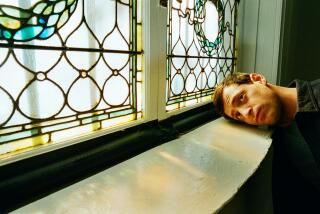Review: Ben Vereen, Ronald Reagan and the travesty of blackface, potently remembered
- Share via
The problem with reenacting a blackface minstrel show, even to make a political point, is that on some level, it is still a blackface minstrel show. That was Ben Vereen’s problem at Ronald Reagan’s 1981 inaugural gala, where Vereen performed a musical hommage to fellow black entertainer Bert Williams, a vaudevillian who was forced to perform in blackface at the turn of the 20th century.
Vereen intended the number as a prelude to a critique of racial discrimination, but the telecast omitted the second part of his act, leaving viewers at home with only a partial impression — that of an Uncle Tom, shucking and jiving for a gleeful white crowd.
This is also Edgar Arceneaux’s challenge in his performance and video installation, “Until, Until, Until …” at Susanne Vielmetter Los Angeles Projects. In it, black actor Frank Lawson reenacts Vereen’s reenactment. The piece is in some ways a reparation, but it is also a dissection. Arceneaux tackles the complex phenomenon of blackface, with its curious mix of affection and derision, by throwing the focus onto the audience, where in many ways it has always belonged.

SIGN UP for the free Essential Arts & Culture newsletter »
The piece was performed live the first weekend of June and appears in the gallery as a video projected onto translucent stage curtains. Behind is the set, populated by only a coat rack and a makeup table with a lighted mirror. On the back of the mirror is a video monitor playing the telecast of Vereen’s performance. It is enhanced with video effects that make it look as if it’s disintegrating. The effect parallels the subsequent crumbling of Vereen’s career and also Arceneaux’s attempt to atomize the damaging event.
Lawson, a magnetic performer, runs through Vereen’s act twice. The stage is bathed in video projections: live footage of Lawson and the current-day audience, as well as the original telecast, often focusing on crowd reaction shots.
THE ARCHIVES: Sitting in on the 2015 rehearsals for “Until, Until, Until ...” »
The first run-through adheres — cheekily, unfaithfully — to the broadcast, in which Vereen’s truncated act was followed by Donny and Marie Osmond. (Lawson plays Donny, joined by a sparkly Mel Mehrabian as Marie.)
The second is a version of the performance as it was originally intended. For this, audience members are invited onto either side of the stage, facing one another. The move forces us to acknowledge our role as spectators. There’s no getting around the fact that we are watching a blackface performance — no matter how many generations removed — and are complicit in its humiliations. At the performance I attended, despite Lawson’s virtuosic singing and dancing, nobody applauded. I suspect no one wanted to find themselves in league with the laughing inauguration crowd projected all around us.
This is the power and beauty of Arceneaux’s work: Its ability not only to excavate the traumas and travesties of blackface, but to locate them in the fears and desires of the audience, us.
Susanne Vielmetter Los Angeles Projects, 6006 Washington Blvd., Culver City. Through July 1; closed Sundays and Mondays. (310) 837-2117, www.vielmetter.com
Support coverage of the arts. Share this article.
YOU MIGHT ALSO LIKE:
How ‘Home’ at LACMA rethinks ideas about Latin American art
From the 92nd floor of one of New York’s new ‘supertall’ towers
The puppet orgy is back: A triumphant ‘Young Caesar’ at Disney Hall
More to Read
The biggest entertainment stories
Get our big stories about Hollywood, film, television, music, arts, culture and more right in your inbox as soon as they publish.
You may occasionally receive promotional content from the Los Angeles Times.










